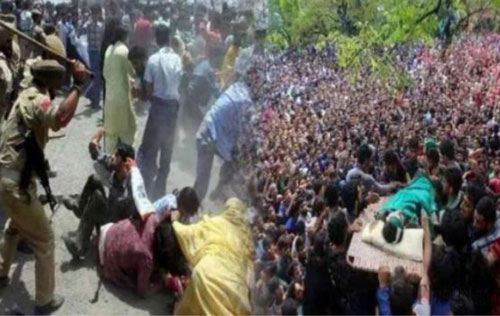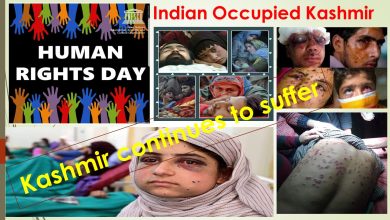
Political history in Kashmir is rife with betrayal, manipulation, systematic structural, militarized state violence, and human rights violations. Powerful rulers, politicians, military bureaucracies, and nationalists in the Indian media are responsible for the oppression in the occupied territory. They have worked together for decades to colonize this beautiful land.
A significant part of India’s colonization project is the oppression, disempowerment, and invisibilization of Kashmiris. Strategies of assimilation and elimination have been combined. Kashmir’s history has been appropriated and distorted unrelentingly through attempts to dehumanize the Kashmiri people.
International legal luminaries have described these violations as ‘crimes against humanity’, as they exceed the threshold for ‘crimes’ under international law. The Office of the High Commissioner for Human Rights has observed: “Impunity for human rights violations and lack of access to justice are key human rights challenges in… Jammu and Kashmir.”
As with the ongoing genocide in Gaza, the international community has brazenly watched silently, unwittingly perpetuating the dismal status quo of Indian occupation. This inaction has allowed the Indian government to entrench its control over the region further, intensifying its human rights abuses and oppression of the Kashmiri people.
Fear permeates every sphere of life
An uneasy and indignant resignation pervades Kashmir’s social and political landscape. It is dotted with military bunkers, concertina wires, unmarked mass graves, a panopticon of digital surveillance, and militarized schools and medical spaces. Countless women and men have been raped, killed, blinded, murdered, tortured, disappeared, and imprisoned.
Fear permeates people’s daily lives in every way. Military authorities have intensified their repressive regimes over the last few years, targeting human rights advocates, journalists, academics, and members of civil society to silence voices of rebellion.
The Indian government has shown no interest in transitional justice that acknowledges the root causes of discontent, ends human rights abuses, and halts impunity for killing, maiming, or silencing dissenters. A concession of this kind would harm the settler-colonization enterprise.
Silencing the dissenting voices
An exhaustive, but chilling report by the Kashmir Law and Justice Project (KLJP), titled “They Should Be Beaten and Skinned Alive: The Final Phase of India’s War on Kashmir Civil Society,” documents the cases of journalists who have been detained, tortured, or deprived of their passports.
Human rights advocate Khurram Parvez, whose family endured harassment and incessant house raids, remains incarcerated in a high-security prison in India. Parvez was named by Time magazine as one of the 100 Most Influential People of 2022. Due to the unrelenting fight he has waged against human rights violations and injustices in Kashmir, he has been silenced.
The universities have dismissed several academics and incarcerated them without due process. Scholars and academics are subject to close surveillance, intimidation, and harassment. Having raised the Kashmir issue at a conference 14 years ago, a College of Law principal, Dr Sheikh Showkat, has been imprisoned and charged with sedition. A campaign has been launched to silence Arundhati Roy, who has become a global figure.
Weaponizing law and legalizing repression
Having legalized repression through its courts and its cabal of rabid anti-Kashmir and anti-Pakistan rhetoric, vocalized by its foot soldiers in the media, the Hindu nationalist government has suppressed voices emanating from colonized territory.
In what Haley Duschinski and S.N. Gosh have described as ‘occupational constitutionalism,’ the ruling Hindu nationalist party of PM Modi has unashamedly politicized the law and legalized repression in Kashmir. A series of legal tools used by colonizing authorities to suppress Kashmiris include the Jammu and Kashmir Public Safety Act, 1978 (PSA) and the Armed Forces Special Powers Act, 1990 ( “AFSPA”).
Described as a ‘lawless law’ by Amnesty International, the PSA is a weapon used against dissenting voices to incarcerate them arbitrarily and for an indefinite period. AFSPA, on the other hand, serves both as a sword and a shield. While shielding itself from accountability and legal consequences, the Indian army used AFSPA as a sword against dissenters.
In violation of international humanitarian and human rights laws, the state privileges AFSPA and PSA over India’s Protection of Human Rights Act of 1993. Besides allowing for two years of detention without trial, the PSA also fails to uphold basic principles of justice such as equal treatment, formal charge sheets, due process, legal representation, etc. There is no accountability for those who misuse this suppression instrument to win medals for murder.
During a staged police encounter in December 2020, a sixteen-year-old juvenile, Athar, along with two other civilians, were murdered. Parents and other family members were charged with counterterrorism crimes when they demanded the body of the deceased for burial.
Digital panopticon
Military authorities use technology-assisted surveillance and predictive tools, including facial recognition software. Businesses have been forced to install CCTV systems and submit daily footage to the authorities, threatening civil liberties and privacy.
With these technologies of state-sponsored terror, individuals might be identified and targeted for their political beliefs or activities. People may feel they must remain silent for fear of retribution, leading to a culture of self-censorship. It is also possible that occupational forces will misuse this data.
The unmistakable digital panopticon is intended to monitor public spaces and preempt mass mobilization by residents already besieged behind razor-wire and steel barriers.
The occupying authorities have recently blatantly shut down Amnesty International’s India office for highlighting human rights issues in India and Kashmir. The NGO has been intimidated and harassed by police, prompting the UN Special Rapporteur to ask India, among other things, to provide proof of AI allegations, the legal basis for government action, and demonstrate that the government will ensure that human rights activists, including lawyers, can operate in an environment free from threats and harassment.
Kashmiri artists, including poets and musicians, have been intimidated, harassed, and detained. While the government forces are on a witch-hunt for them, they remain undeterred and continue to create protest music underground.
In the absence of legal representation in the Indian courts, Kashmiri students are hounded, harassed, intimidated, or killed equally brutally by vigilante groups and law enforcement. In 2021, the students were charged with celebrating the Pakistan cricket team’s win over India during the T20 World Cup.
Weaponing media against Kashmiris
Soft repression’s sharpest tool is weaponized media. Nationalists reframe the resistance narrative as anti-national. Invoking the specter of terrorism and whipping up anti-Pakistan and anti-Kashmiri vitriol, the media fabricates the consent of unsuspecting Indians for military violence against Kashmiris.
The colonial authorities recently banned several resistance groups, describing them as unlawful associations. Labeling resistance organizations stigmatizes, delegitimizes, and discredits them, undermining their recruitment and mobilization efforts.
This preemptive repression is marked by defilement, harassment, surveillance, prohibitions, detentions, torture, and targeted and custodial killing of the members of these organizations by the paramilitary personnel. The malicious aim is to increase the costs of supporting resistance against Indian rule.
Using police and army spokesmen as objective sources of information, colonizing authorities play down Kashmiri political resistance. They justify dubiously legalistic and excessively militaristic retaliation as a lawful response to the presumed ‘threatening law-and-order situation. The rejection of Indian hegemony is portrayed as a threat to India’s unity and integrity.
In contrast to what India would have the rest of the world believe, petitioning for national security laws and incarceration laws against Kashmir dissenters is not an exceptional and extraordinary measure; it is integral to their Brahminical colonial-settler enterprise. It is the cutting-edge tool with which they chisel the settler-colonial Hindu state into existence.
Kashmir as a settler-colonial laboratory
Kashmir has become the Hindutva-inspired settler-colonial laboratory for the ruling Hindu nationalist policy. They are ready to hold Kashmir forever, even though they can keep it only at gunpoint.
They reframe the heartless state-sanctioned violence, reducing the Kashmiri to a pro-Pakistan (therefore anti-Indian) agent, who, as a terrorist enemy, must be killed or otherwise neutralized by a permanent removal from social and political life through prolonged and unremitting jail sentences.
Battle of Survival
As a result of an ever-evolving repressive regime, the state has lost its moral authority to rule Kashmir. Resentment against Indian rule has reached a point of no return due to the state’s deceitful political maneuvering and brutal militarism.
In a vastly asymmetrical power relationship with the colonizer, Kashmiris fight a battle for survival as they suffer material, psychological, and physical impacts from the conflict. A long haul is ahead of them. Currently, they are digging in under the shadow of the guns.








